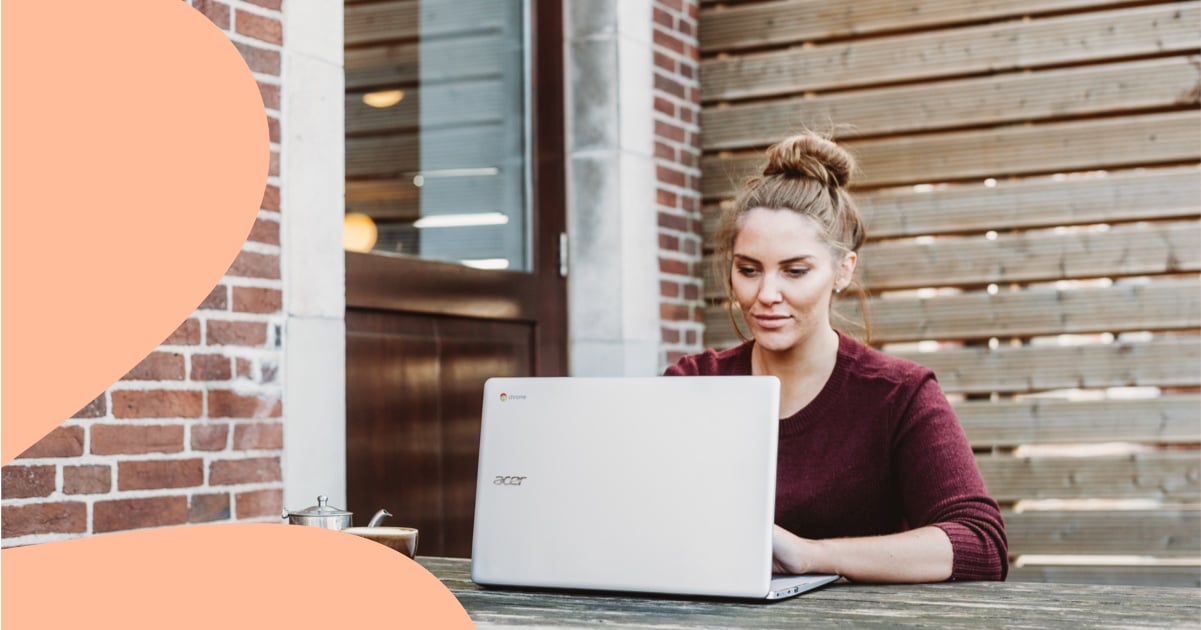It doesn’t make a whole lot of sense, but to qualify for true working from home tax relief in Germany the self-employed need a separate room only for work.
That’s right, a home office in Germany must:
- Be a separate room that is incorporated into your home
- Be equipped with office supplies and equipment
- Be used at least 90% of the time for work purposes
- Leave enough space for all residents to live comfortably outside of the office
In light of what’s happened in the world over the past year and a bit, it’s fair to question this policy. But for the time being, it is what it is.
So for those who don’t have the luxury of a spare room, here are Holvi’s 9 nifty workarounds to help you save money on taxes.
If you do have a separate home office, skip ahead to learn how to get working from home tax relief.
9 nifty freelance tax workarounds
🏡 1. Home office flat rate (Homeoffice-Pauschale)
The German Government introduced the ‘home office flat rate' (Homeoffice-Pauschale) as last-minute legislation in December 2020, to cover the additional costs of home office during corona for those who don’t have a separate room. It covers €600 per year and was mainly meant for employees. BUT…
While German politicians always use 'employees' when speaking about it, the final legislation actually states ‘taxpayers’. In other words, it’s open to everyone.
That’s right, freelancers and the self-employed can claim the home office flat rate.
How does the home office flat rate (Homeoffice-Pauschale) work?
If you’re self-employed in Germany and don’t have a separate home office room,
You can claim €5 for each day you work from home, up to a maximum of €600.
This means you’re covered for 120 days of the year.
The home office flat rate was created to compensate for additional expenses such as electricity, water and heating. And the best part? You do not have to prove any expenses to the Finanzamt.
You can claim the home office flat rate for years 2020 and 2021. Note that it also applies to part-time self-employed, the only stipulation is that the taxpayer must work all day exclusively at home – no mid-day trips to a client's office or the coffee shop.
🪑 2. Office furniture
Even if you can’t deduct the cost of the room itself, you can deduct office furniture provided it’s used exclusively for business purposes. That pricey office chair you bought to support your back and your post-work gaming habit? You can expense that.
📱 3. Phone and internet
Telephone and internet costs are also deductible. You’ll just have to calculate the percentage of business, not personal, use to avoid possible difficulties in case of a tax audit.
📎 4. Low-value assets (GWG)
Low-value assets (or GWGs in German) up to €800 net (or €952 with VAT) can be deducted from your taxes as a simple business expense for the financial year you buy them in.
This includes all the usual office supplies like pens, notebooks and paperclips – provided you use them for work purposes and not to fashion an alluring outfit for KitKat.
🖨 5. Fixed assets (pricier business expenses)
Fixed assets are things (objects, rights, financial assets) that are meant to serve your company on a permanent basis and exceed €800 in net value. For fixed assets the total purchase price can’t be deducted all at once in one tax year. Rather, you deduct their value over time as depreciation.
For example...
You run your own portrait photography business and buy a fancy Fujifilm X100V camera for €1,495. plus disposable film for €15. You’ll use the camera for many years, so it’s a fixed asset and as such is treated differently in your books. The film, on the other hand, will only last a few weeks, so you deduct it normally as a low-value asset (GWG).
In Germany, the Federal Ministry of Finance (Bundesfinanzministerium) has laid out regulated periods in a depreciation table. Find your industry here.
Side note – what is depreciation?
Depreciation is a form of tax optimisation. When you buy something expensive, it loses value over time. You can spread out bigger expenses over time. That way, as your asset depreciates, the amount you owe in taxes decreases proportionally.
Going back to our camera example...
Say the Bundesfinanzministerium regulates a depreciation period of 3 years for cameras (making its ‘useful life’ for tax purposes 3 years) you can ‘depreciate’ your new Fujifilm X100V expense at €498.33 for a period of 3 years (1,495 / 3) – assuming its ‘salvage value’ is €0.
If you can sell a used Fujifilm X100V easily for €400 after 3 years (giving it a salvage value of €400), the calculation would be: (1,495 - 400) / 3 = 365. This method of calculating depreciation is called the straight-line method.
💬 6. German classes (sometimes)
Language courses can be deducted when they’re strictly for work reasons. For example, Germans can deduct a ‘business English’ course.
Doing a German course as a foreigner living in Germany is considered a personal expense. The Federal Finance Court counts expenditure for German courses as part of the ‘non-deductible cost of living’ (file reference: VI R 14/04). For this reason, you typically can’t deduct it as a business expense.
Happily, there's a workaround!
To deduct German language classes from taxes, you’ll need evidence from a client stating that they require it.
Looking to become a German citizen?You can also deduct an ‘integration’ course as part of the naturalisation to Germany process (Einbürgerung) – but only when the Foreigner’s Registration Office (BAMF) requires it. |
🎁 7. Client gifts
Small gifts keep friendships alive, and the same goes for client relationships. Everyone loves a random box of chocolates to let them know they’re loved.
The self-employed can claim one gift per client per year, up to a value of €35. Anything over that is a no-go for tax deductions.
✔️ 8. Insurance
You can deduct insurance from your taxable income. When filling out your income tax declaration, you’ll be asked to include the total amount paid for health insurance during the financial year, along with any other business insurances you may have paid, including:
- Loss of Earnings Insurance – Verdienstausfallversicherung
- Occupational Disability Insurance – Berufsunfähigkeitsversicherung
- Professional Liability Insurance – Berufshaftpflichtversicherung
- Personal Liability Insurance – Privathaftpflichtversicherung
- Legal Protection Insurance – Rechtsschutzversicherung
- Old age provision / pension insurance – Private Altersvorsorge
🧑🏿🤝🧑🏿 9. Co-working spaces
If you’re self-employed, rental costs for co-working spaces are tax deductible. The same goes for workshops and artist studios used solely for work purposes.
Just note, you might be asked to submit floor plans of the building. The tax office uses this info to calculate deductible rent and utility values.

How to get working from home tax relief as a freelancer?
If you use a separate room in your apartment only for work, you can deduct a maximum of €1,250 yearly as business costs. You can also deduct other workroom related costs including:
- Interest (Zinsen)
- Building deductions or rent (Miete oder Gebäudeabschreibungen)
- Repair Costs (Reparaturkosten)
- Waste disposal (Müllabfuhr)
- Home insurance contributions (Hausversicherungen)
- Renovation and Maintenance (Instandhaltung und Renovierung)
- Property Tax (Grundsteuer)
Deducting self-employed taxes – what forms to fill out?
Depending on your self-employed business type, you’ll either fill out Anlage S or Anlage G along with your annual income tax return.
Unsure which business type you are? Read our guide to self-employed business types – Freiberufle or Gewerbe. All your questions will be answered, promise.
Our final tax workaround? Holvi – for work-life balance
As a freelancer, any time you’re not spending on taxes is time you can spend doing actual work – you know, the kind that brings in revenue.
Holvi simplifies expense management and small business bookkeeping. Each time you pay for a business expense with your Holvi Business Mastercard®, you can scan the receipt, categorise the transaction and add notes for you or your accountant – so you stay tax-ready all year long.




/6_how_it_works.png?width=477&name=6_how_it_works.png)